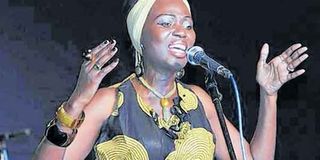Traditional beats take centre stage at Weekend Live

What you need to know:
This week however promises plenty as Wikendi Live hosts a unique and vibrant monthly live music event dedicated to showcasing traditional African beats and fusion.
Dar es Salaam. Live gigs in Dar have been quite a rare happening in the past one month for what many assume are very obvious reasons
This week however promises plenty as Wikendi Live hosts a unique and vibrant monthly live music event dedicated to showcasing traditional African beats and fusion.
This comes in the heels of their last event that hosted artistes such as Uganda’s Keneth Mugabi and the Marahaba Band that left revellers asking for more.
Organisers say in the spirit of promoting traditional African music they have lined up aritses such as the Zawose Family from Tanzania , Sali Oyugi from Kenya and Mapanya Band from Zanzibar at the Nafasi Art Space in Dar es Salaam.
They promise the same amount of energy to performances on a stage that has in the past year hosted the likes of Eric Wainaina and Oliver Mtukudzi plus several others.
The artistes that have been chosen seem to fit the billing given their rich profiles and pedigrees that spun years of performances across the globe.
The Chibite Zawose Family is not a new name in the entertainment arena.
It is a group that was founded by the late Dr Hukwe Ubi Zawose the legendary singer, multi-instrumentalist master musician who specialised in Wagogo music.
The group now has 35 active members with most being close family members who are taught from an early age, continue playing this style of music that has its roots from the Gogo people of the Dodoma.
The Gogo are famous worldwide for their unique vocal harmonies and instruments including marimba, zeze, irimba and ngoma.
What makes Gogo music extra special is the singing which is haunting and captivating – it doesn’t matter if you don’t understand the language, the power is in its intensity.
Sali Oyugi
Sali Oyugi is a singer/songwriter and social activist with a dual heritage from Nyanza Province in Kenya and the Tanga in Tanzania.
Sali cherishes her dual cultural heritage and took the time to study the traditional rhythms, songs and dances from both the Luo and the Wazigua .
The result has been the beautiful rhythms and sounds that she brings forth in her guitar playing and vocals during her performances.
Sali started performing while still residing in Kenya, where she mainly worked under the sponsorship of the Alliance Francaise in Nairobi and she once got a rare opportunity of sharing the stage with renowned South African jazz maestro Hugh Masekela.
In 1997 she left for United Kingdom, where she performed at a Solar Energy Convention. It was during this time that she met another renowned Kenyan singer and songwriter, Ayub Ogada.
This was to act as a self realization trip because after this Sali released her first solo project – a three-song CD, which set the rythmn for her future wiorks as a solo artiste.
She then moved to in Boston US where she performed with many diverse musicians and ensembles.
While in the USA Sali played at the Somerville Theatre, curtain raising for Oliver “Tuku” Mutukudzi.
During this time also headlined at various festivals including the Africa in April Festival in Memphis, Tennessee.
Her first album ‘Vuma!’ was released in 2002 with the follow up which was titled ‘The Return: Journey back to the Source’ coming some five years later in 2007.
In 2008, Sali moved back to East Africa where she continued to perform at The Alliance Francaise and the Goethe-Institut in Nairobi.
In 2010, Sali took a break from performing to work on her fourth album which she titled ‘Mabawa’.
During this break Sali took time to work on another album Asante Baba which she donated to the church as her way of thanking God.
Sali has also been featured on the Ketebul “Spolight on Kenyan Music Vol 4” in a duo with Suzanna Owiyo on the track titled Makeba.
After six years of working on the Mabawa project Sali in 2016 released a new album titled Uromo in the first quarter of the year.
Her songs are more of her musical journey and heritage, whereas ‘Kikulacho’ and ‘Uromo’ takes you back to her benga routes on the shores of Lake Victoria, Chegelese brings out her connection with the Zigua in Tanga.
Beyond music, Sali has launched an arts initiative: Leko Arts Initiative which seeks to nurture and develop the talents of children who hail from Nairobi’s poor neighborhoods.
Mapanya Band
Mapanya Band is an Afro Fusion, Hip-Hop, Reggae and Bongo-Flava Band from Zanzibar. A diverse group of talented musicians, they sing, compose and perform their own songs that reflect the sounds and feelings of low-income communities, the truth of their own lived experience.
It remains interesting how they just fit in what seems to be a world class act even after they have proved to be just as good.
But as they say to be a true star you should be able to challenge the best and hopefully they will.





